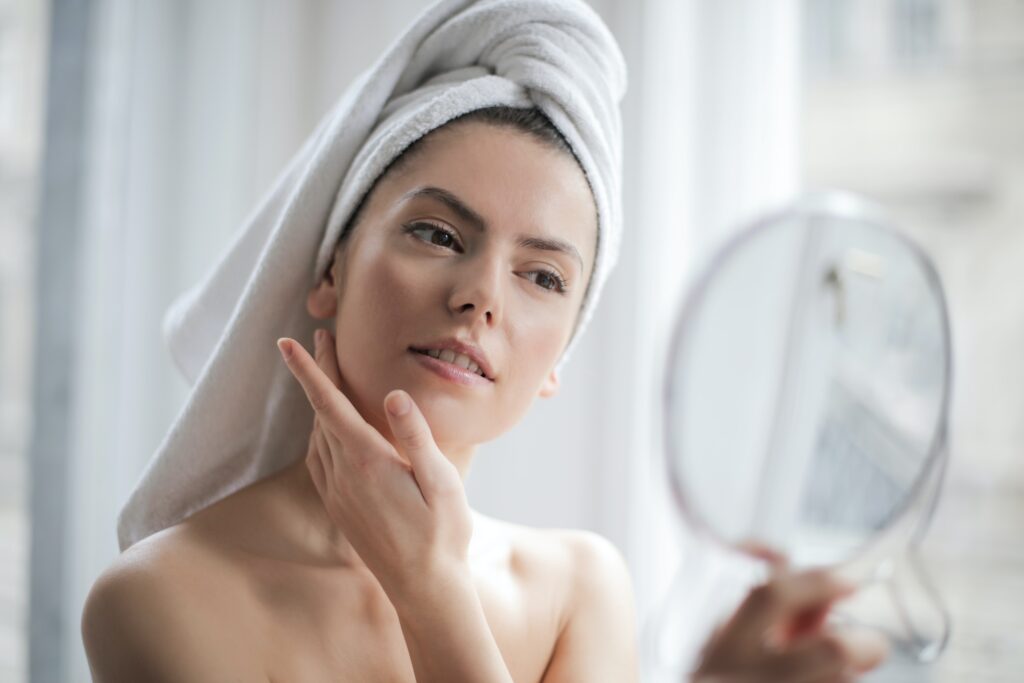Hyperpigmentation is a common concern characterised by darkened skin patches or spots. It occurs when an excess amount of melanin, the pigment responsible for skin colour, is produced in certain areas. Various factors, including sun exposure, hormonal changes, acne scars, and ageing, can cause hyperpigmentation. If you want to decrease hyperpigmentation in your face and achieve a more even skin tone, this comprehensive guide will provide effective strategies and skincare tips to address this concern.
-
Protect Your Skin from Sun Damage
Sun exposure is one of the leading causes of hyperpigmentation. Protecting your skin from the sun’s harmful UV rays prevents further darkening and allows existing pigmentation to fade. Start by wearing broad-spectrum sunscreen with a high SPF (30 or above) daily, even on cloudy days. Reapply every two hours and seek shade during peak sun hours. Additionally, wear wide-brimmed hats and protective clothing to minimise sun exposure. Consistent sun protection is key to preventing and reducing hyperpigmentation.
-
Incorporate Brightening Ingredients
Certain skincare ingredients are known for reducing hyperpigmentation and promoting a more even skin tone. Look for products containing:
- Vitamin C: Known for its antioxidant properties, it helps inhibit melanin production and brighten the skin. Use a vitamin C serum or cream daily to target hyperpigmentation.
- Hydroquinone: This skin-lightening ingredient is available with a prescription in low concentrations, over-the-counter or higher strengths. It works by inhibiting melanin production and is effective in reducing hyperpigmentation. Consult with a dermatologist before using hydroquinone and follow their recommendations.
- Retinoids: Derived from vitamin A, retinoids promote cell turnover and help fade hyperpigmentation. Incorporate a retinoid serum or cream into your nighttime skincare routine. Start with a low concentration and gradually increase usage to avoid skin irritation.
- Alpha hydroxy acids (AHAs): AHAs, such as glycolic and lactic acid, exfoliate the skin, promoting cell turnover and fading hyperpigmentation. Look for cleansers, toners, or serums containing AHAs to incorporate into your skincare routine.
- Kojic acid: Derived from fungi, kojic acid inhibits melanin production and can lighten hyperpigmentation. Look for products with kojic acid as an active ingredient.
-
Exfoliate Regularly
Exfoliation helps remove dead skin cells, allowing new, healthy cells to emerge and promoting a more even skin tone. However, be cautious when exfoliating hyperpigmented skin, as excessive or aggressive exfoliation can worsen the condition. Opt for gentle exfoliants like chemical exfoliants (AHAs or BHAs) or mild physical exfoliants. Start with once or twice a week and adjust frequency based on your skin’s response. Always follow exfoliation with ample hydration and sun protection.
-
Targeted Treatments
There are specific treatments available that can target hyperpigmentation and provide visible results. Consult a dermatologist or skincare professional to explore the following options:
- Chemical Peels: Chemical peels use a solution to remove the top layers of the skin, revealing fresher, brighter skin underneath. They can effectively reduce hyperpigmentation, but it’s important to undergo this treatment under professional supervision.
- Microdermabrasion: This non-invasive procedure uses a diamond-tipped wand or crystals to exfoliate the skin and fade hyperpigmentation. It’s suitable for mild cases of hyperpigmentation and can be performed by a skincare professional.
- Laser Treatments: Therapists like intense pulsed light (IPL) and fractional lasers can target hyperpigmentation and stimulate collagen production for a more even skin tone. These treatments require multiple sessions and should be done by a trained professional.
-
Patience and Consistency
Reducing hyperpigmentation takes time and consistent effort. Results won’t happen overnight, so be patient and stay committed to your skincare routine. Consistency is key in using the appropriate skincare products and incorporating sun protection measures. Stick to your chosen products and treatments for a few months to allow them to work effectively.
- Additional Advice
If your hyperpigmentation is severe, persistent, or causing significant distress, it’s advisable to seek professional advice from a dermatologist. They can evaluate your skin, determine the underlying cause of the hyperpigmentation, and recommend suitable treatments or procedures tailored to your specific needs. The diet also plays a major role in our skin’s health.
In the Final Analysis
Decreasing hyperpigmentation in your face requires a comprehensive approach that involves protecting your skin from sun damage, incorporating brightening ingredients, exfoliating regularly, considering targeted treatments, practising patience and consistency, and seeking professional advice when needed. Remember that everyone’s skin is unique, and what works for one person may not work for another. Understanding your skin’s needs, being mindful of potential sensitivities, and tailoring your skincare routine is important. With perseverance and the right strategies, you can effectively reduce hyper-pigmentation and achieve a more radiant and even complexion skin.



